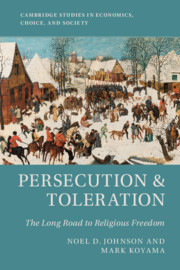Book contents
- Frontmatter
- Contents
- List of Figures
- List of Tables
- Preface
- Acknowledgments
- 1 Toleration, Persecution, and State Capacity
- I Conditional Toleration
- 2 Religion and the State in the Premodern World
- 3 Why Do States Persecute?
- 4 Jewish Communities, Conditional Toleration, and Rent-Seeking
- 5 Climatic Shocks and Persecutions
- 6 The Shock of the Black Death
- II The Origins Of Religious Freedom
- III Implications Of Greater Religious Liberty
- Bibliography
- Index
5 - Climatic Shocks and Persecutions
from I - Conditional Toleration
Published online by Cambridge University Press: 18 February 2019
- Frontmatter
- Contents
- List of Figures
- List of Tables
- Preface
- Acknowledgments
- 1 Toleration, Persecution, and State Capacity
- I Conditional Toleration
- 2 Religion and the State in the Premodern World
- 3 Why Do States Persecute?
- 4 Jewish Communities, Conditional Toleration, and Rent-Seeking
- 5 Climatic Shocks and Persecutions
- 6 The Shock of the Black Death
- II The Origins Of Religious Freedom
- III Implications Of Greater Religious Liberty
- Bibliography
- Index
Summary
Medieval Europe's rent-seeking equilibrium enabled Jews to settle and often to flourish. However, it also left them highly vulnerable to the whims of rulers and to both local elites and commoners who resented their fiscal role. Antisemitic beliefs were deeply rooted in medieval culture, but they manifested themselves most strongly when economic conditions deteriorated. We now describe how these factors combined to bring about a crisis for Jewish communities after 1300.
Already by the end of the thirteenth century the situation of Europe's Jewish communities had deteriorated, but the fourteenth century – a century of plague, warfare, and famine for the entire continent – was nothing short of catastrophic. First, in 1290 England's small Jewish community was expelled wholesale by Edward I. Then, in 1306 Philip IV of France expelled the Jews of France. Though they were invited to resettle a decade later by his son, the unrest that followed the Great Famine of 1315–1321 saw a series of pogroms across the country. Numerous pogroms also took place in the German lands during this period, but these pale in comparison to the Europe-wide persecutions that commenced with the Black Death (1347–1352), which we discuss in Chapter 6.
In this chapter we seek to explain why the conditional toleration equilibrium was particularly fragile in societies whose economies were close to subsistence and where political authority was weak. We test this argument by identifying the impact of economic shocks on the conditional toleration equilibrium using random fluctuations in growing season temperatures across European cities. We then use these temperature fluctuations to probe under what sorts of geographic and institutional constraints the conditional toleration equilibrium was more or less stable.
Agricultural output in medieval Europe was highly dependent on weather patterns. Farmers did not have access to chemical fertilizers or scientific agronomy. Storage technologies were underdeveloped and transporting grain over long distance expensive. The risk of harvest failure due to climatic fluctuations was very real. In Bruce Campbell's evocative words, nature was a “historical protagonist.”
This vulnerability was heightened by the early fourteenth century, as Europe was densely settled by the standards of a preindustrial economy. During the previous two centuries of economic and demographic expansion, forests had been cut down, marshes drained, and marginal land taken into cultivation.With a population of around 80 million, the continent was close to its Malthusian carrying capacity.
- Type
- Chapter
- Information
- Persecution and TolerationThe Long Road to Religious Freedom, pp. 94 - 107Publisher: Cambridge University PressPrint publication year: 2019



